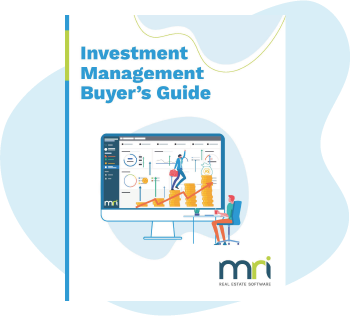What can future AI-enabled real estate investment look like?
Artificial intelligence experts always talk about how this technology will transform business across every organizational level. In real estate, we hear a lot about how property owners and operators can reduce operational costs and boost profitability through automation and time-saving features. But something is missing from the conversation when it comes to improving the daily lives of investment asset managers.
I recently shared a few predictions on The Real Deal of ways AI will help asset managers focus on the higher-level, value-creating aspects of their jobs in the next few years. These ideas included using artificial intelligence to power scenario modeling with formerly unavailable data, empower investors by turning conversational questions into insight-filled reports, and help asset and portfolio managers focus on delivering value while boosting investor confidence.
Advanced scenario modelling and forecasting
The biggest draw for artificial intelligence in real estate investment is how it will help asset managers get more actionable insights into portfolio opportunities and make smarter capital investment decisions.
Scenario testing
Asset managers spend most of their time testing how different asset and market variables affect portfolio assets and potential acquisitions to make the best investment decisions. However, many managers must rely on static models that only use manually entered, general market variables. This time-bound data increases the risk of wide variations and inaccuracies stemming from data entry errors.
AI will enhance scenario modeling by continuously updating asset evaluation models with real-time data from both portfolio assets and market sources. AI can continuously filter the data, smoothing out trendlines and uncovering anomalies for further review. AI models can also uncover trends in the data to provide guidance on future outcomes.
Streamlining analysis with NLP
The biggest changes will be made in testing user experience. Natural Language Processing (NLP) will let asset managers make complex market and asset queries with simple questions. For example, an asset manager could use a solution like MRI Ask Agora to enter a query like “Show me a model with interest rates at 5% versus at 4.5%.” Instead of performing a simple data lookup, AI would aggregate data and perform complex calculations to deliver valuable insights.
An AI model could also manipulate multiple variables simultaneously to provide a variety of outcome possibilities, greatly expanding an asset manager’s analytical capabilities beyond what could be accomplished in a spreadsheet.
Balancing automation with human oversight
It’s important to remember that asset managers won’t completely delegate analytical tasks to artificial intelligence. Investment firms should never assume that AI is a “black box” with no visibility into how the model determines a valuation. There are always nuances to how assets perform or how markets trend that AI can’t determine based on data alone. Asset managers must always know why something was valued the way it was and understand how the system made that determination.
Humans must still be in the driver’s seat, providing oversight in setting conditions and parameters for analysis while AI handles the complex calculations. So, AI models will let users isolate assets and variables to see how they affect performance. Asset managers can then determine exactly why a model didn’t perform well or made a certain prediction. That human expertise is vital to knowing and understanding what trends AI models uncover.
Fielding investor requests with intelligent portals
Making an asset manager’s daily work more efficient also extends to responding to client requests for asset information and customized reports. Asset managers are seeing higher volumes of these questions, diverting time from managing the portfolio, uncovering new deals, and creating more value.
Most firms offer self-service portals with basic, high-level information summaries and reporting. Artificial intelligence can transform these portals into dynamic and interactive investor tools.
Increasing self-service capabilities
Investment firms can implement high-powered chatbots trained on large language models to streamline responses to routine investor questions. Instead of taking time away from asset managers, AI can deliver fast responses to queries about current portfolio and individual account values, current fees and invoices, upcoming earnings reports, and more.
Even greater changes will come with advances in natural language processing (NLP). Artificial intelligence can integrate diverse data sources, including commercial and residential real estate, asset management, and facilities data along with regional and economic data. Investors could ask the chatbot questions like, “Show me the top 10 performing office buildings in the Southeast region” or “What are the most profitable locations of Company X in the portfolio?” AI would then perform the requested analysis and use ChatGPT-like generative capabilities to produce actionable insights and reports directly to the investor, freeing asset managers from hours of manual data manipulation and complex reporting.
Fund reporting as a living document
Artificial intelligence also has the potential to transform the firm’s static financial reporting into living documents that investors can tailor to their needs. Expanding on the portal’s NLP and generative AI capabilities, investors can receive customized reports featuring the data points and metrics most relevant to their needs. Any number of report types can be run covering any number of analyses, all without impacting the asset manager’s time. Reporting will be like Microsoft Co-Pilot: a virtual assistant can examine an investor’s portfolio details and previous queries and then suggest different ways to build reports – even build and send them proactively.
Another benefit to AI-enabled reporting is that the reports will become more meaningful to investors, since the insights will be tailored to the metrics they care about the most. Meeting these investor needs more accurately – and quickly – will help boost investor confidence and retention.
Get the full story
These are just a few of the ways artificial intelligence will transform the daily working lives of asset managers. For a deeper dive into the future of real estate investment, please read the full article over at The Real Deal.
Investment Tech Buyer's Guide
Reduce risk and ensure investor satisfaction with investment management for real estate

Make Smarter Decisions with AI-Powered Business Intelligence
Explore how Business Intelligence (BI) and data management can revolutionize decision-making in the real estate industry. This webinar features industry experts, including Andy Birch, VP at MRI Software, Justin Manning, Senior Specialist at Microsoft…
